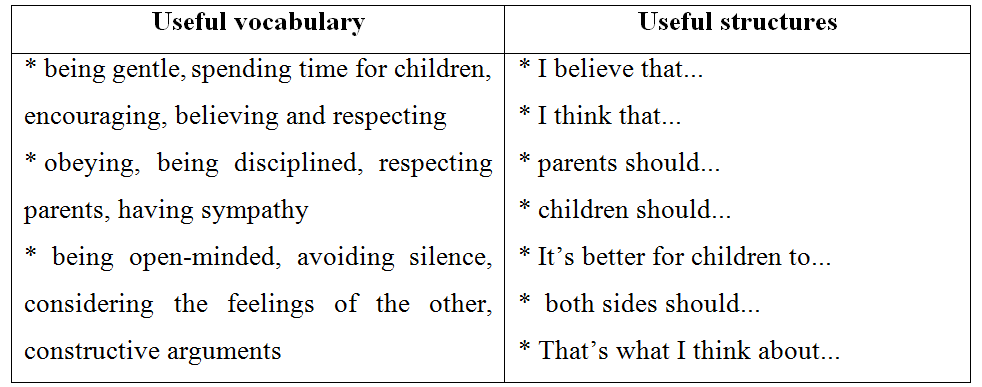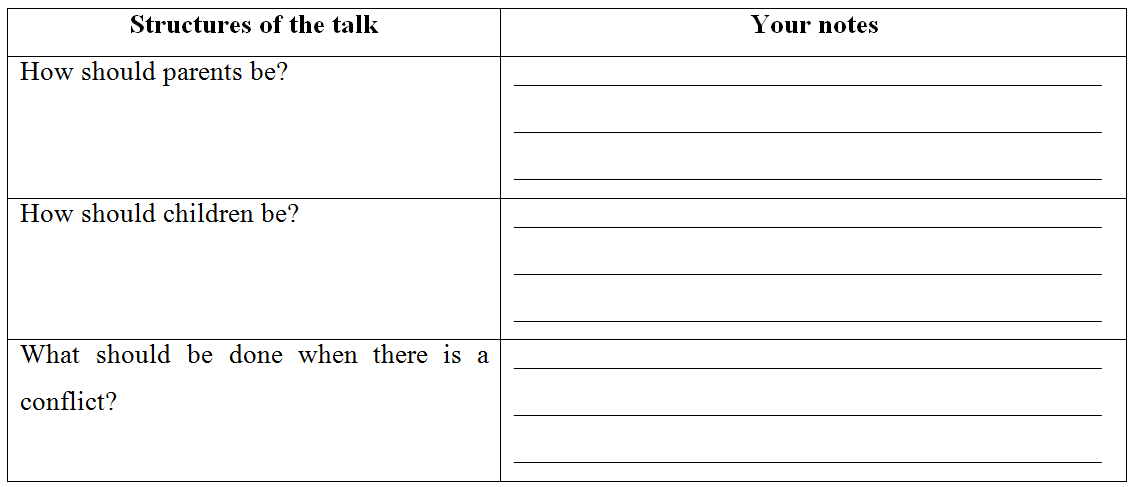Trắc nghiệm Chuyên đề 11 Unit 1. The Generation Gap !!
Câu 1 :
Choose the best option to complete each of the following sentences.
She is__________through some fashion websites to find a new hairstyle.
She is__________through some fashion websites to find a new hairstyle.
Câu 2 :
Older people often find current__________hard to adjust to.
Câu 3 :
My mother used to teach me and my brother table__________when we were children.
Câu 4 :
If you are a part of a (n) __________, you may live with your grandparents, aunts and uncles.
Câu 5 :
You can’t__________your child to watch the movie that he doesn’t like.
Câu 6 :
Parents are pleased when their children know how to be__________of others.
Câu 7 :
It is not difficult to understand why__________clothes are more and more popular among youngsters these days.
Câu 8 :
Parents’ strict rules may put more__________on teenagers.
Câu 9 :
Different__________in a family often result in interesting debates and occasional disagreements.
Câu 10 :
Parents should__________the time that teenagers spend on social networks and computer games.
Câu 11 :
Generation gap is less challenging for adults who have a positive__________towards current trends.
Câu 12 :
Her parents are quite__________. They don’t allow her to date till she finishes university.
Câu 13 :
His father imposed a__________to force him to come home no later than 9 p.m.
Câu 14 :
Children are not__________enough to understand their parents’ way of thinking.
Câu 15 :
Mutual__________can be a solution to generation gap.
Câu 16 :
Teenagers tend to spend more time__________with their peers than with their parents.
Câu 17 :
Are you sure that your parents won’t be angry if you__________have your nose?
Câu 18 :
Show your children that you respect their__________by knocking the door before entering.
Câu 32 :
Underline the content words in the following sentences:
You should trust your children’s decisions.
Câu 34 :
Decide which of these words are unstressed in the following sentences.
Each generation sets its own fashion trends and taste in music.
Each generation sets its own fashion trends and taste in music.
Câu 35 :
Which changes in traditional values could contribute to generation gap?
Câu 36 :
Children almost can’t decide what should be necessary for them.
Câu 37 :
Our parents expect the best things for us.
Câu 38 :
I realised that we had too many differences.
D. differences
Câu 39 :
Decide whether the underlined words are stressed or unstressed.
There was a lot of conflicts between him and his father.
Decide whether the underlined words are stressed or unstressed.
There was a lot of conflicts between him and his father.
B. unstressed
Câu 40 :
What do you think about generation gap?
Câu 41 :
My brother grew up in a more open environment.
Câu 42 :
Living in an extended family can be a challenging situation.
Câu 43 :
My family has members whose opinions vary widely.
Câu 44 :
Different generations often have different viewpoints on the same issue.
Câu 45 :
My parents listen to me even when they are very busy.
Câu 46 :
Mia’s parents didn’t like her new hairstyle.
Câu 47 :
There are no global standards of attitudes.
Câu 48 :
What does generation gap actually mean?
Câu 49 :
Choose the best option to complete each of the following sentences.
Our family is qoinq to travel abroad this summer, so we__________get our passport soon.
Our family is qoinq to travel abroad this summer, so we__________get our passport soon.
Câu 50 :
Students__________look at their notes during the test.
Câu 51 :
You__________find time for some relaxation every day.
Câu 52 :
Each generation is likely to have different thoughts about how the family__________ interact.
Câu 53 :
All the students__________obey the school rules.
Câu 54 :
My back has been hurting for weeks. I__________go to the doctor’s.
Câu 55 :
My family__________pay a lot of taxes every year.
Câu 56 :
The local authority is really strict about protecting that piece of lawn. You walk around it.
Câu 57 :
It is a great party but I__________go now.
Câu 58 :
Sometimes parents__________be tolerant of their children’s childlike behaviours.
Câu 59 :
All students__________complete their homework before going to class because it’s a rule.
Câu 60 :
Parents__________spend more time talking to their children to enhance family bonding.
Câu 61 :
If you want to be a friend of your children, you__________change your mind about modern music and fashion.
Câu 62 :
The buffet restaurant is free for kids under 5 years old, so you__________pay for your son.
Câu 63 :
You__________tell anyone about what I told you. It’s a secret.
Câu 64 :
I__________stay up late tonight because I have a lot of exercises to do.
Câu 65 :
You__________judge other people based on their appearance.
Câu 66 :
Spectators__________show their tickets before they enter My Dinh stadium.
Câu 67 :
Vietnamese visitors__________ought to have a Schengen visa to travel to Spain and Belgium.
Vietnamese visitors__________ought to have a Schengen visa to travel to Spain and Belgium.
Câu 68 :
When playing in the water park, children__________be accompanied by adults.
Câu 69 :
You__________drive If you don’t have a driving licence.
Câu 70 :
We__________book a table in advance at this restaurant. Just turn up and we’ll be served right away.
Câu 71 :
I think you__________let your daughter know your financial burden. She is mature enough to share with you.
I think you__________let your daughter know your financial burden. She is mature enough to share with you.
Câu 72 :
You__________respect your family values.
Câu 73 :
I will give you 5 more minutes to complete your exercise, and you__________submit it to me at 10:30
Câu 74 :
You__________have your hair dyed when you are a student. It’s forbidden.
Câu 75 :
Your children are very sensitive during their teenage years, therefore, you__________be rude to them.
Your children are very sensitive during their teenage years, therefore, you__________be rude to them.
Câu 76 :
Teenagers__________spend too much time on social networks such as Facebook.
Câu 77 :
She__________attend extracurricular activities because she lives too far from the school.
Câu 78 :
Everyone thinks that he__________follow his father’s footsteps and become a doctor.
Câu 79 :
Choose the underlined part which needs correction.
I must to study for the exam because there isn’t much time left.
Câu 80 :
She decided to watch her favourite movie because she mustn’t go to school.
Câu 81 :
Do you think that we have to change our mind about what to wear at the party?
Do you think that we have to change our mind about what to wear at the party?
Câu 82 :
You shouldn’t eating too much junk food. It has a detrimental effect on your health.
Câu 83 :
Those protected trees don’t have to be cut down.
Câu 98 :
Read the passage and choose the best answer to each of the following questions.
The generation gap between the parents and the children is due to the fact that the parents have experienced real life and whatever they have learned from personal experiences becomes a true knowledge for them. Suppose that they have succeeded in life by following a path, they may want their children to follow the same path for success. For example, if they have worked very hard in studies and got a good government job, they may advice their children to do the same for a having a good life as them. This also happens in other dimensions. The parents tend to treat their personal experiences as universal knowledge, which is false. What work for one person may not work for any other person because people have different talents and aptitudes. Moreover, the times have changed in the new generation and now a number of new avenues and challenges have come about which your parents have no idea or experience.
The children have no experience of the real life, hence they take a fresh look of everything in life. They may be guided by the experiences of their parents but they are also guided by the experiences of other people and by their own desires, talents and aptitudes. They want to experiment with their life and discover their own path. However, parents love their children so much that they don’t want them to suffer failure. They want them to be safe by following their path which is tested by them. This difference of opinion gives rise to the so-called generation gap.
What is the reason of the generation gap mentioned in the passage?
Read the passage and choose the best answer to each of the following questions.
The generation gap between the parents and the children is due to the fact that the parents have experienced real life and whatever they have learned from personal experiences becomes a true knowledge for them. Suppose that they have succeeded in life by following a path, they may want their children to follow the same path for success. For example, if they have worked very hard in studies and got a good government job, they may advice their children to do the same for a having a good life as them. This also happens in other dimensions. The parents tend to treat their personal experiences as universal knowledge, which is false. What work for one person may not work for any other person because people have different talents and aptitudes. Moreover, the times have changed in the new generation and now a number of new avenues and challenges have come about which your parents have no idea or experience.
The children have no experience of the real life, hence they take a fresh look of everything in life. They may be guided by the experiences of their parents but they are also guided by the experiences of other people and by their own desires, talents and aptitudes. They want to experiment with their life and discover their own path. However, parents love their children so much that they don’t want them to suffer failure. They want them to be safe by following their path which is tested by them. This difference of opinion gives rise to the so-called generation gap.
What is the reason of the generation gap mentioned in the passage?
A. The parents assume that their personal experience in real life is true for them.
B. The parents want their children to get a good government job.
C. The parents succeeded in life by following a path.
D. The parents give wrong advices to their children.
Câu 99 :
The word “universal” in line 6 means_________.
Câu 100 :
Why is treating personal knowledge as universal knowledge not reasonable?
A. Because people have different talents and aptitudes.
B. Because people gain knowledge from different contexts and apply it in different fields.
C. Because times have changed in different generations.
D. Both A and C are correct.
Câu 101 :
According to the passage, which factor does not guide the children in life?
Câu 102 :
What do the children want to do?
A. They want to suffer failure.
B. They want to be safe by following the path tested by their parents.
C. They want to experiment with their life and discover their own path.
D. They want their parents to love them so much.
Câu 104 : The breadth of differences of generation gaps remains unchanged in the 20th and 21st centuries.
Câu 106 : During the 1960s, the younger generation had different beliefs and opinions compared their parents.
Lời giải có ở chi tiết câu hỏi nhé! (click chuột vào câu hỏi).
Copyright © 2021 HOCTAP247




